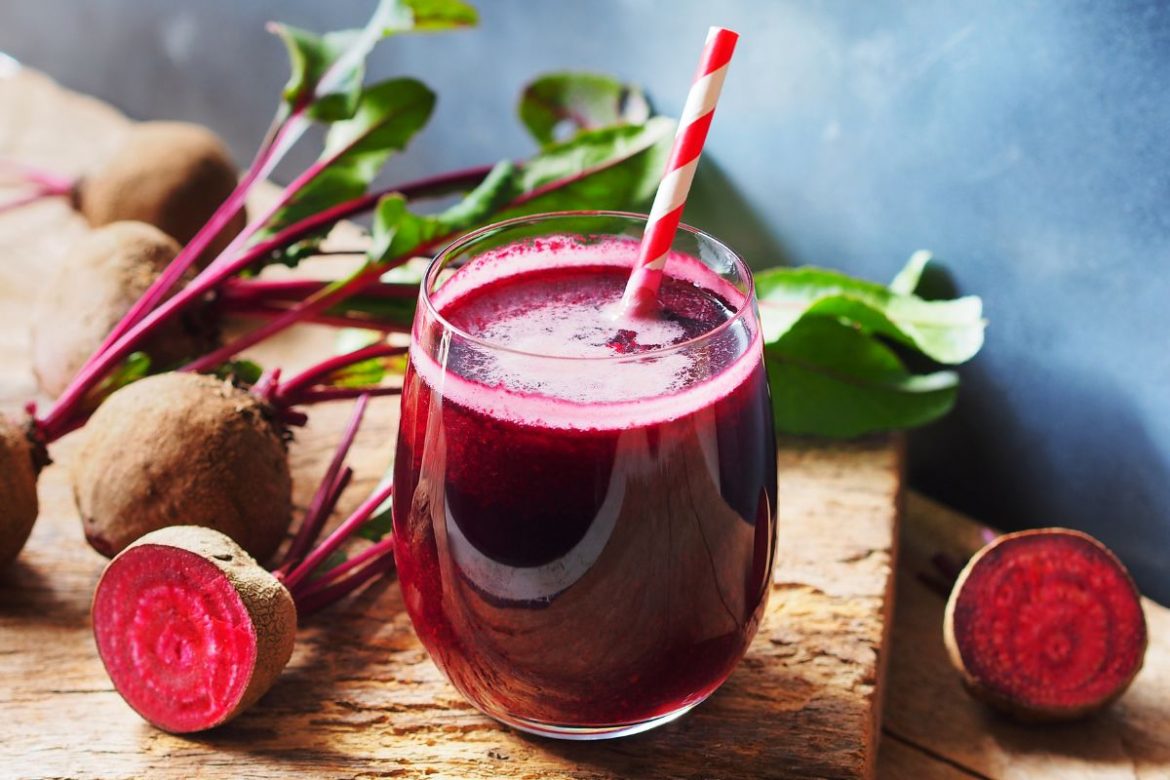Beetroot juice has gained popularity in recent years as a natural performance-enhancing drink that can potentially make you stronger. This vibrant red juice, derived from the taproot portion of the beet plant, is rich in various beneficial compounds that have been linked to improved athletic performance and increased strength. Here we delve into the benefits of beetroot juice for running.
A new study by researchers at the University of Exeter and the US National Institutes of Health has found that consuming nitrate, found in beetroot juice, increases muscle strength. It is already known that beetroot juice increases endurance and lowers blood pressure, but the reasons behind these effects and how your body uses the nitrates are not really known.
The Benefits of Drinking Beetroot Juice for the Health
One of the key components of beetroot juice that contributes to its strength-enhancing properties is its high nitrate content. Nitrates are naturally occurring compounds found in certain vegetables, including beets, and they play a crucial role in the body’s nitric oxide (NO) production.
Nitric oxide is a vasodilator, meaning it widens blood vessels, allowing for increased blood flow and oxygen delivery to working muscles.
Improved Circulation and Nutrient Delivery
When you consume beetroot juice, the nitrates it contains are converted into nitric oxide in the body. This increased nitric oxide production helps to relax and expand blood vessels, resulting in enhanced blood flow and nutrient delivery to your muscles during exercise.
This improved circulation can lead to increased strength and endurance, as well as reduced fatigue.
Enhanced Muscle Efficiency and Energy Production
Furthermore, beetroot juice has also been shown to improve muscle efficiency and energy production. Studies have demonstrated that beetroot juice supplementation can enhance the efficiency of mitochondria, which are the energy-producing units within our cells.
By improving mitochondrial function, beetroot juice allows for more efficient conversion of nutrients into energy, leading to enhanced muscular performance and strength.
Antioxidants, Vitamins, and Minerals
In addition to its nitrate content, beetroot juice is a rich source of antioxidants, vitamins, and minerals. These include vitamin C, manganese, potassium, and folate, which all contribute to overall health and well-being.
The antioxidants present in beetroot juice help combat oxidative stress and reduce inflammation, which can aid in recovery and promote muscle growth.
Recommendations and Individual Responses
To experience the strength-boosting benefits of beetroot juice, it is often recommended to consume it around 1-2 hours before exercise. The optimal amount varies depending on factors such as body weight, but a typical serving size is about 250-500 milliliters.
However, it is essential to note that individual responses may vary, and it is advisable to consult with a healthcare professional before making significant changes to your diet or supplementation routine.
Beetroot Juice as Part of a Balanced Approach
While beetroot juice can potentially enhance strength and performance, it should not be viewed as a magical solution. It is crucial to maintain a well-balanced diet, engage in regular exercise, and prioritize overall healthy lifestyle habits to maximize your strength and athletic potential.
The Benefits of Beetroot Juice for Running
Here are some of the benefits of beetroot juice for running:
- Improved endurance: Beetroot juice is rich in dietary nitrates, which are converted into nitric oxide in the body. Nitric oxide helps improve blood flow and oxygen delivery to muscles, leading to enhanced endurance during exercise. This means that runners may be able to sustain their efforts for longer periods without feeling fatigued.
- Increased oxygen utilization: By improving blood flow and oxygen delivery, beetroot juice can enhance the efficiency of oxygen utilization by muscles. This can lead to better overall performance, as more oxygen is available to the working muscles, allowing them to function optimally and delay fatigue.
- Enhanced cardiovascular health: Regular consumption of beetroot juice has been associated with improvements in cardiovascular health. The nitrates in beetroot juice help dilate blood vessels, reducing blood pressure and improving overall cardiovascular function. This can be particularly beneficial for runners, as a healthy cardiovascular system is essential for endurance and performance.
- Reduced oxygen cost of exercise: Studies have shown that beetroot juice may help reduce the oxygen cost of exercise. This means that runners may require less oxygen to maintain a given pace or intensity. A lower oxygen cost can improve running economy and make running feel less strenuous, allowing athletes to perform at a higher level for longer periods.
- Faster recovery: The anti-inflammatory properties of beetroot juice can aid in post-exercise recovery. Intense exercise can lead to muscle damage and inflammation, causing delayed onset muscle soreness (DOMS). The antioxidants and phytonutrients present in beetroot juice help reduce inflammation and promote faster recovery, allowing runners to bounce back quicker and train more effectively.
- Nutrient-rich: Beetroot juice is a natural source of essential vitamins, minerals, and antioxidants. It contains vitamins A, C, and K, as well as minerals like potassium, magnesium, and iron, which are crucial for maintaining overall health and optimal athletic performance. These nutrients play a vital role in energy production, muscle function, and immune system support.
- Convenient and versatile: Beetroot juice is readily available in most grocery stores and can be easily incorporated into a runner’s diet. It can be consumed as a standalone drink or mixed with other fruits and vegetables to create nutrient-packed smoothies. The versatility of beetroot juice allows runners to experiment with different flavors and combinations to suit their preferences.
Conclusion
In conclusion, beetroot juice’s high nitrate content, ability to increase nitric oxide production, and positive impact on muscle efficiency and energy production make it a promising natural beverage for improving strength.
When combined with a well-rounded approach to fitness and nutrition, beetroot juice can be a valuable addition to your regimen in pursuit of enhanced physical performance.
Beetroot Juice FAQs
Beetroot juice is known for various health benefits, including lowering blood pressure, improving blood flow, increasing stamina, supporting liver function, and providing a rich source of antioxidants and nutrients such as folate, potassium, and vitamin C.
Beetroot juice contains a high concentration of nitrates, which the body converts to nitric oxide. Nitric oxide helps dilate blood vessels, resulting in reduced blood pressure and improved blood flow.
Studies have shown that consuming about 250 ml (8.45 oz) of beetroot juice daily can provide health benefits. However, it’s essential to consult your healthcare provider before starting any new dietary regimen, as individual needs may vary.
Yes, beetroot juice can enhance athletic performance by increasing nitric oxide levels in the body, which improves blood flow, oxygen delivery, and overall stamina. Many athletes consume beetroot juice before exercise to boost their performance.
Beetroot juice is generally safe for consumption, but some people may experience mild side effects, such as an upset stomach, diarrhea, or beeturia (red or pink urine). Individuals with kidney disease or taking blood pressure medication should consult their healthcare provider before consuming beetroot juice.
Drinking beetroot juice daily is generally safe for most individuals. However, it’s essential to maintain a balanced diet and not rely solely on beetroot juice for nutrition. If you have any concerns or pre-existing conditions, consult your healthcare provider.
Yes, you can make beetroot juice at home using a juicer or blender. Wash and peel fresh beets, cut them into small pieces, and process them in your juicer or blender. You can also add other fruits or vegetables to enhance the flavor and nutritional value.
Beetroot juice can be part of a healthy weight loss plan as it is low in calories and high in nutrients. However, it should be combined with a balanced diet and regular exercise for optimal results.
Homemade beetroot juice should be consumed within 24 hours, as it lacks the preservatives found in store-bought varieties. Store it in an airtight container in the refrigerator to maintain freshness.
Beetroot juice is generally safe for pregnant and breastfeeding women, as it provides essential nutrients. However, it’s crucial to consult your healthcare provider before adding beetroot juice to your diet during pregnancy or breastfeeding, as individual needs and sensitivities may vary.




